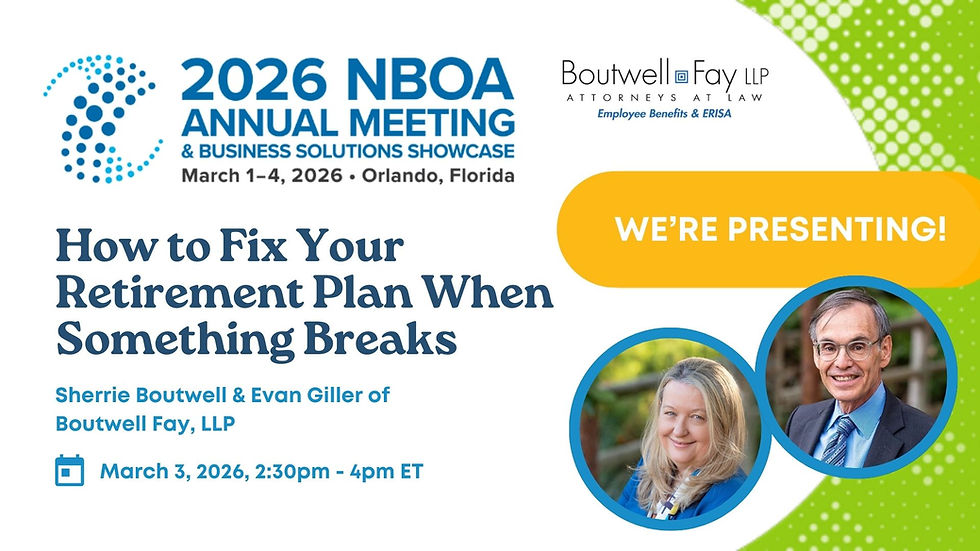Secure 2.0 – Treating Student Loans as Elective Deferrals
- Boutwell Fay LLP

- Mar 16, 2023
- 2 min read
Updated: Jul 11, 2023
SECURE 2.0 was signed into law in December 2022 as part of the Consolidated Appropriations Act of 2023. Effective for plan years beginning after 2023, certain types of plans containing elective deferral features may choose to treat student loan payments as elective deferrals and make matching contributions on those amounts. These optional provisions are available to 401(k) plans, 403(b) plans, SIMPLA IRAs, and governmental 457(b) plans.
Background
The new law is intended to assist employees who are unable to take advantage of employer matching contributions because they are burdened by student debt and cannot afford to make elective deferrals from their pay to receive the maximum matching contributions to which they would otherwise be entitled. The new law provides clarity on how the contributions are treated, and their effect on nondiscrimination testing. It defines qualified student loan payments as any amount paid towards indebtedness incurred for an employee’s (not their family or dependents) qualified higher education expense.
How it works
Although we are expecting guidance from the IRS, the statute contemplates that employees will make student loan payments and certify those payments to the employer. The employer matches those amounts in the plan using the plan’s match formula and subject to the plan’s vesting schedule. If adopting these provisions, all employees eligible to make elective deferrals and receive match must be eligible to receive match on student loan payments. The maximum student loan payments that may be considered is the lesser of the 402(g) or 415(c) limits applicable to the employee for the year minus elective deferrals made. The match on student loan payments may be made at the same frequency as other match but is not required to adhere to the same frequency. In any case, the match on student loans must be made at least once a year.
Testing Considerations
The student loan payments are not considered plan contributions, and thus not subject to the requirements of ADP testing, 415 limits or the Average Benefits Test. The plan may perform a separate ADP test for the employees who were matched on student loans. SIMPLE IRAs, plans with a safe harbor arrangement, QACA, or starter 401(k) plans may treat the student loan payments as elective deferrals or after-tax contributions for the purpose of making matching contributions. The matching contributions are plan contributions and subject to testing, which can be performed separately for employees who received matching contributions on student loan payments.
Key Takeaways
Once available starting in 2024, this new option will be a great tool to attract and retain top talent. Employers who are interested should contact their plan service providers to get more information and get in line to start implementation – we expect a lot of demand for this new opportunity!
Our attorneys can help you navigate this complex and evolving area of law. Please contact a Boutwell Fay attorney at attorneys@boutwellfay.com for more information.







Discover what is bioethanol and why it’s increasingly viewed as a cleaner alternative fuel source through UNICCM’s detailed guide that outlines both environmental and economic considerations. The article explains how ethanol is derived from plant-based materials and how this process supports renewable energy goals. It also highlights the advantages of reduced emissions and compatibility with existing fuel systems. UNICCM provides clear context for both industry professionals and curious readers alike.
Detailed and practical, this guide explains concrete rebar in a way that feels approachable without oversimplifying. The step by step clarity is especially useful for readers new to the subject. I recently came across a construction related explanation on https://hurenberlin.com that offered a similar level of clarity, and this article fits right in with that quality. Great شيخ روحاني resource. explanation feels practical for everyday rauhane users. I checked recommended tools on https://www.eljnoub.com
s3udy
q8yat
elso9
Using technology to increase access to youth mental health support may offer a practical way for young people to reach guidance, safe-spaces, and early help without feeling overwhelmed by traditional systems. Digital platforms, helplines, and apps could give them a chance to seek support privately, connect with trained listeners-orexplore resources that might ease their emotional load. This gentle shift toward tech-based support may encourage youth to open-up at their own pace, especially when in-person help feels too heavy to approach.
There is always a chance that these tools-quietly make support feel closer than before, creating moments where help appears just a tap away. Even a small digital interaction might bring a sense of comfort. And somewhere in that space, you…
Regarding Wearing the right work clothes isn’t just about following the law but it also about comfort and safety in the end. For example, construction work clothes are designed to meet strict safety and durability requirements on active sites. Proper PPE aligns closely with health and safety modules taught at UNICCM.
The topic “Secure 2.0 – Treating Student Loans as Elective Deferrals” highlights an important step toward improving financial wellness for employees. Allowing student loan payments to count as retirement contributions helps young professionals build long-term savings while managing education debt. This policy creates a smarter balance between present obligations and future security, especially in today’s economy. Clear guidance and thoughtful implementation will be key to its success. Just like this structured financial approach, usa embroidery digitizing focuses on precision, compliance, and quality—ensuring every design is accurately prepared for production while meeting professional standards and expectations.